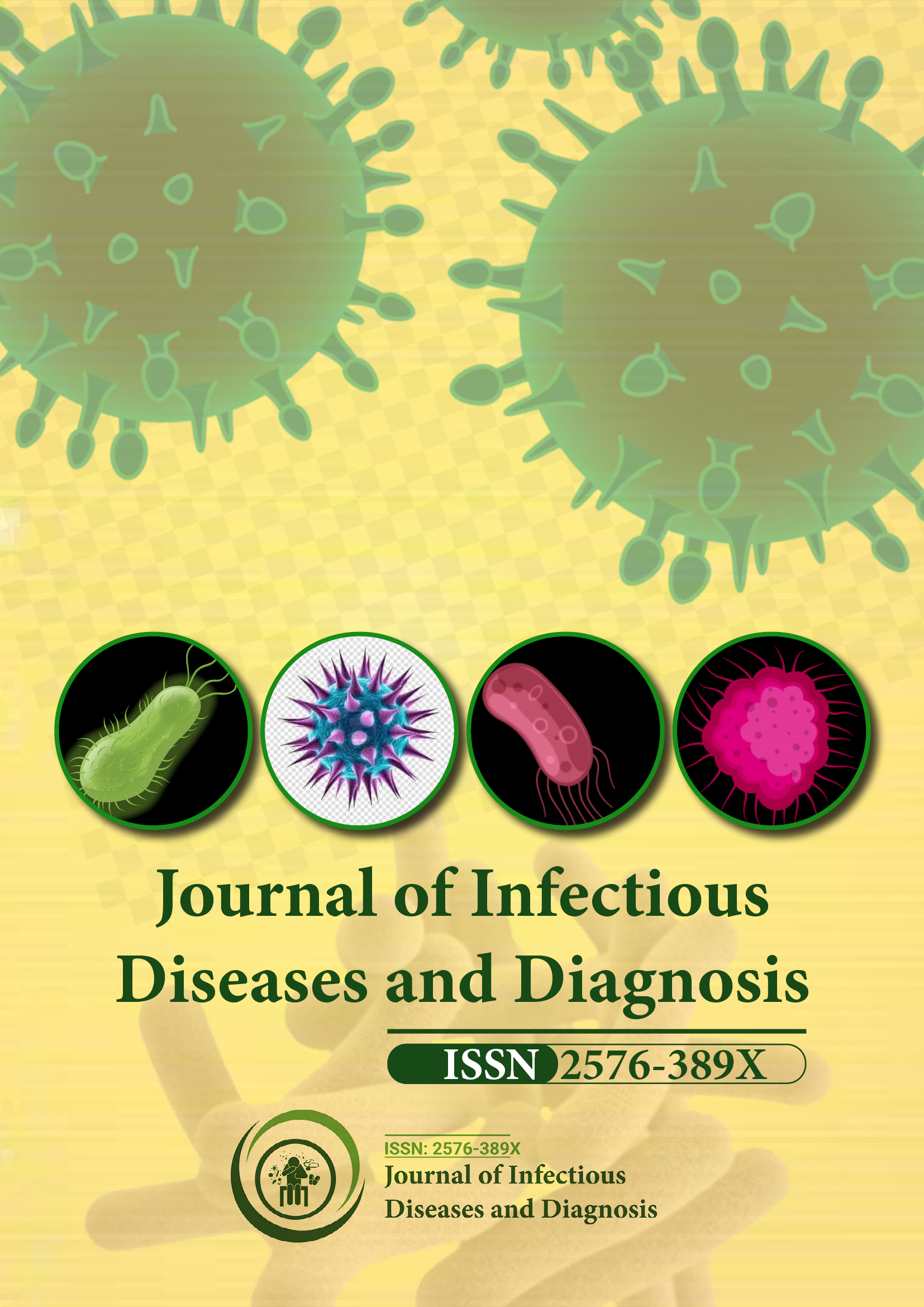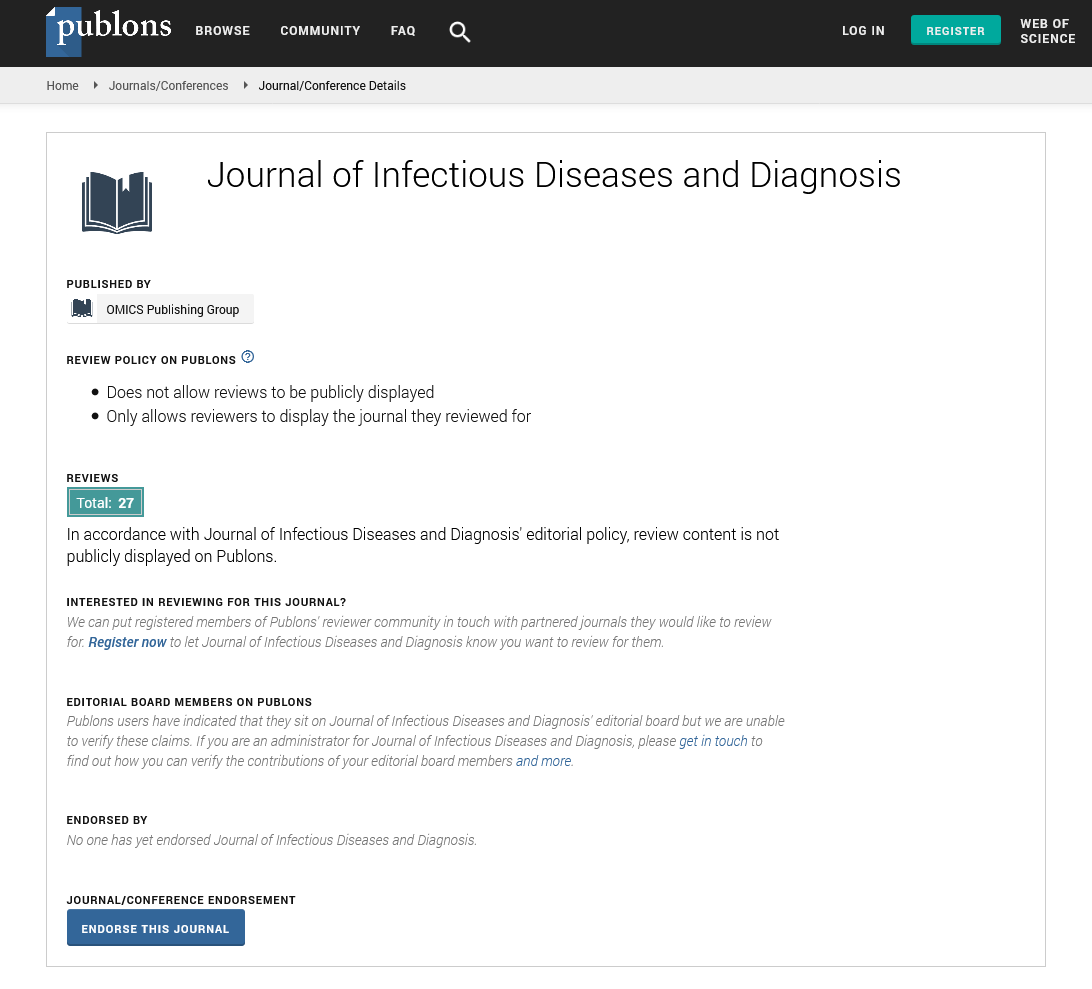Indexed In
- RefSeek
- Hamdard University
- EBSCO A-Z
- Publons
- Euro Pub
- Google Scholar
Useful Links
Share This Page
Journal Flyer

Open Access Journals
- Agri and Aquaculture
- Biochemistry
- Bioinformatics & Systems Biology
- Business & Management
- Chemistry
- Clinical Sciences
- Engineering
- Food & Nutrition
- General Science
- Genetics & Molecular Biology
- Immunology & Microbiology
- Medical Sciences
- Neuroscience & Psychology
- Nursing & Health Care
- Pharmaceutical Sciences
Opinion Article - (2023) Volume 8, Issue 6
Ebola's Impact on Human Antibody Profiles: Infection and Vaccination Insights
Akira Miyasaka*Received: 16-Oct-2023, Manuscript No. JIDD-23-23542; Editor assigned: 18-Oct-2023, Pre QC No. JIDD-23-23542 (PQ); Reviewed: 01-Nov-2023, QC No. JIDD-23-23542; Revised: 08-Nov-2023, Manuscript No. JIDD-23-23542 (R); Published: 16-Nov-2023, DOI: 10.35248/2576-389X.23.08.239
About the Study
The Ebola virus is well known for its high mortality rates and fast transmission, has been a significant public health concern in recent years. The development of effective vaccines and therapeutic treatments is critical to combating this deadly disease. One of the key factors in understanding the immune response to Ebola is the characterization of the human antibody repertoire following both infection and vaccination. In this study, we will explore the implications and insights provided by studies on the human antibody response to Ebola virus infection and vaccination.
Ebola Virus Disease (EVD) is a highly contagious, often fatal illness caused by the Ebola virus. The virus primarily affects humans and other primates and is transmitted to people from wild animals. Human-to-human transmission occurs through direct contact with the blood, secretions, organs, or other bodily fluids of infected people, as well as surfaces and materials contaminated with these fluids.
One significant aspect of understanding the antibody response to Ebola infection is characterizing the antibodies produced in response to the virus. Research has shown that a variety of antibody types are generated, including IgM, IgG, and IgA antibodies. IgM antibodies are the first to appear and are relatively short-lived, while IgG antibodies persist and provide long-term immunity. IgA antibodies play a role in mucosal immunity and can prevent the virus from entering the body through mucous membranes.
Vaccination strategies
Vaccination against the Ebola virus has been a focus of research and development. Several vaccine candidates have been tested, with some showing positive results. One of the most notable vaccines is the Recombinant Vesicular Stomatitis Virus–Zaire Ebola Virus (rVSV-ZEBOV-GP) vaccine, which was found to be highly effective in a clinical trial conducted during the West African Ebola outbreak.
Understanding the antibody response following vaccination is crucial for vaccine development and optimization. Studies have demonstrated that individuals who receive the rVSV-ZEBOV-GP vaccine develop specific IgM and IgG antibodies against the Ebola glycoprotein. This indicates that the vaccine effectively affects an immune response that mirrors what occurs during natural infection.
Importantly, vaccine-induced antibodies can persist for an extended period, providing long-term protection against Ebola. This long-lasting antibody response is a key factor in the success of vaccination efforts.
Cross-reactivity and cross-protection
Another interesting aspect of the antibody response to Ebola infection and vaccination is the concept of cross-reactivity and cross-protection. Cross-reactivity refers to the ability of antibodies to recognize and neutralize different strains of the virus, potentially providing protection against various Ebola virus species.
Studies have demonstrated that antibodies produced in response to the Zaire Ebola virus, the species responsible for the majority of EVD outbreaks, can cross-react with other Ebola species, such as Sudan and Bundibugyo. This cross-reactivity suggests that vaccination or natural infection with one Ebola species may offer some degree of protection against other species, enhancing the potential utility of vaccines.
Cross-protection is a related concept, indicating the ability of antibodies to protect against related viruses, not just other strains of the same virus. Research has shown that the antibodies produced in response to Ebola infection or vaccinations can also cross-react with the Marburg virus, another deadly filovirus. This intriguing finding suggests that Ebola vaccines may offer some level of cross-protection against Marburg virus, potentially streamlining vaccine development efforts against both viruses.
Immune memory and booster strategies
Understanding the persistence of vaccine-induced antibodies is critical for long-term protection. Research indicates that individuals who receive the rVSV-ZEBOV-GP vaccine maintain high levels of specific antibodies for at least two years. This is optimistic for long-term immunity but also raises questions about the necessity of booster doses.
In the context of a highly infectious and deadly virus like Ebola, ensuring durable immunity is essential. Studies are ongoing to determine the optimal timing and need for booster vaccinations to maintain a robust and long-lasting immune response.
Implications for future vaccine development
The insights gained from studying the human antibody response following Ebola virus infection and vaccinations have significant implications for future vaccine development. These implications extend beyond just Ebola and can inform strategies for combating other emerging infectious diseases.
Firstly, understanding the specific types of antibodies produced and their kinetics in response to infection and vaccination provides crucial information for vaccine design. It can help researchers fine-tune vaccine formulations to mimic the natural immune response as closely as possible, enhancing the effectiveness of vaccination.
Secondly, the concept of cross-reactivity and cross-protection offers exciting possibilities for broad-spectrum vaccines. If antibodies generated against one species of the Ebola virus can protect against others and potentially even against related viruses like Marburg, this knowledge can be used in the development of vaccines that offer broader protection against multiple filoviruses.
Thirdly, the investigation of immune memory and the potential need for booster doses can guide vaccination strategies. Maintaining long-term immunity is vital, and determining the optimal timing for booster shots can ensure continued protection against Ebola and similar infectious diseases.
Conclusion
The study of the human antibody repertoire following Ebola virus infection and vaccination is a critical area of research with profound implications for public health. Vaccines against Ebola have shown optimistic in recent years, and the ability to mimic and enhance the natural immune response through vaccination is a testament to the progress in immunology and virology. Additionally, the potential for cross-reactivity and cross- protection against other filoviruses like Marburg broadens the scope of vaccine development efforts. In the face of emerging infectious diseases, such research not only aids in tackling the specific virus in question but also informs strategies for developing vaccines against other deadly pathogens.
Citation: Miyasaka A (2023) Ebola's Impact on Human Antibody Profiles: Infection and Vaccination Insights. J Infect Dis Diagn. 8:239.
Copyright: © 2023 Miyasaka A. This is an open-access article distributed under the terms of the Creative Commons Attribution License, which permits unrestricted use, distribution, and reproduction in any medium, provided the original author and source are credited.

